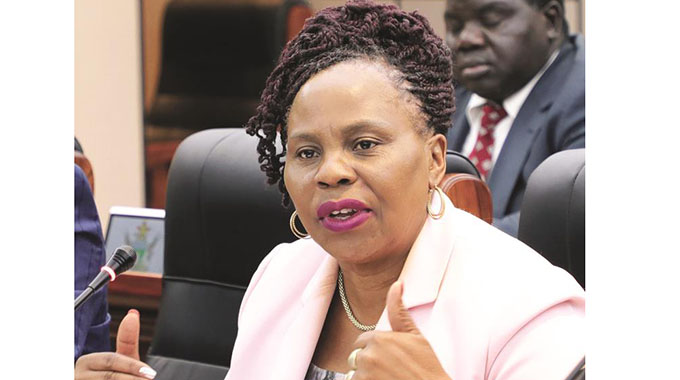Honeymoon over for errant NGOs

Beaven Dhliwayo Features Writer
The Aid Coordination Policy approved by Cabinet recently, aimed at ensuring consistency and harmonisation of development partners’ activities to promote transparency, will not only promote economic growth and aid poverty reduction, but also intermediate outcomes such as health and education.
There is a growing interest in the debate on aid effectiveness to assess its impact on developing economies, and what is crucial is that lack of coordination and non-adherence to good aid principles undermine the desired outcomes.
The need for aid coordination has become a recurrent theme in discussions and strategic thinking of national and international aid agencies.
For example, the Paris Declaration (March 2005) and the Accra Agenda for Action (September 2008) mentioned aid coordination as one of the key mechanisms to be mobilised with a view to enhancing aid effectiveness.
Information,. Publicity and Broadcasting Services Minister Monica Mutsvangwa recently said: “Cabinet considered and approved the Aid Coordination Policy as proposed by the Minister of Finance and Economic Development (Professor Mthuli Ncube). The policy emanated from a review of the Development Cooperation Policy and its accompanying Procedures Manual.
“Furthermore, the policy seeks to ensure consistency in public sector interventions through fostering a collaborative approach between Government and development partners on the issue of development assistance to Zimbabwe.”
She added: “It also includes eliminating costly parallel management structures through ensuring the use of country systems and institutions by all development partners, refocusing aid from projects to programmes and ultimately, to budget support and ensuring that technical assistance is demand-driven, transparent, sustainable and ultimately creates local capacity. The Policy and Procedures Manual will also seek to enhance the sharing of information on development cooperation programmes in the country.”
While significant progress has been made in developing aid coordination systems and tools, aligned with national planning and budgeting processes, there is still a need to improve the efficiency of dialogue with development partners on different levels and in various sectors, particularly bearing in mind that there is a large number of stakeholders involved.
Donor or aid coordination efforts alone will not achieve significant development results unless they are effectively integrated within national development planning and governance structures and systems.
This implies that Government aim of coordination should not dwell only on aid effectiveness, but the broader part of development effectiveness. True to what Minister Mutsvangwa emphasised, it is critical for the Government to make sure that all development partners that come to the country work hand-in-glove with Government institutions.
Zimbabwe is not the only country that works with development partners and for many years, foreign aid has been vital in cushioning the country’s debt burden and supplementing national budgets.
Aid also remains crucial in the attainment of the UN-inspired Sustainable Development Goals (SDGs), which include the provision of primary universal basic education, the eradication of poverty and hunger, the reduction of child mortality and maternal health, the combating of communicable diseases (HIV and Aids, malaria), ensuring environmental sustainability and strengthening of partnership among nations.
What boggles the mind is that these goals, which are supposed to enhance the lives of the generality of Zimbabweans through these loans and grants, have shown little results.
It is, thus, imperative for the Government to be in total control of aid coming into the country and align all programmes of development partners to national development plans, as well as enhancing the transparency and predictability of development assistance.
For decades, in the country, donor aid from foreign lands, either by design or accident, has become a powerful tool, which known Western regimes are using to keep Africa as a begging continent for reasons best known to them.
The so-called donors, particularly from the West, dispense millions of dollars into NGOs purses in the name of safeguarding human rights and promoting democracy, among other things.
Over the past two decades, it is reported that US Agency for International Development (USAID) has spent over US$6 billion pushing for regime change initiatives in Zimbabwe.
Beneficiaries of these huge funds have been using false reports, lies and oftentimes exaggerations to access donor funds. To this end, in 2018 USAID terminated funding for a number of non-governmental organisations (NGOs), including the Election Resource Centre (ERC), the Zimbabwe Human Rights Association (ZimRights) and the Counselling Services Unit (CSU).
USAID provides about US$310 million of aid to Zimbabwe annually.
However, there’s nothing to show that the money has been put to good use suggesting that vast amounts of money have been diverted for personal use.
Project coordinators and managers diverted donor funding for personal use, living large as evidenced by the purchase of luxury cars and houses.
Reports suggests that about 90 percent of donor funds go towards salaries and allowances as they pay themselves hefty packages, with only 10 percent channelled towards operations.
Given the anomalies, Government’s Aid Coordination Policy is important going forward that donor aid comes and goes where it is needed most, not to fatten the pockets of few individuals in the country. There is need for a more systematic approach to the management of assistance within sectors and building capacities in line ministries that will increase the mandate of units dealing with international cooperation, so as to include international assistance coordination and management over relevant donor-funded projects.
All line ministries should also appoint senior programmes officers for management and pre-accession of donor aid coming into the country.
Additionally, an overall national development strategy is needed that would outline the country’s long-term development goals and tasks and include ambitious targets.
Proper monitoring and policy review systems should also be put in place, especially at sector and cross-sector policy and strategy levels.
Moreover, the reason why aid coordination may have positive effects on the level of governance becomes clear as soon as one realises that aid governance can be conceived as a public good.
If a country is alone in setting conditions aimed at improving governance in a recipient country, the benefit from conditionality is likely to be small, because of the recipient country being able to turn to other, more lenient donor countries.
The conditionality-imposing country will, therefore, forsake its strategy or weaken its conditionality.
To overcome that obstacle, there must be a sufficiently large group of donor countries willing to engage in the governance-improving process, thus, lending it a collective character.
Going forward, the Government should be air tight, and avoid leakages of donor funds so as to improve the livelihoods of the populace, who are the rightful beneficiaries of aid money.







Comments